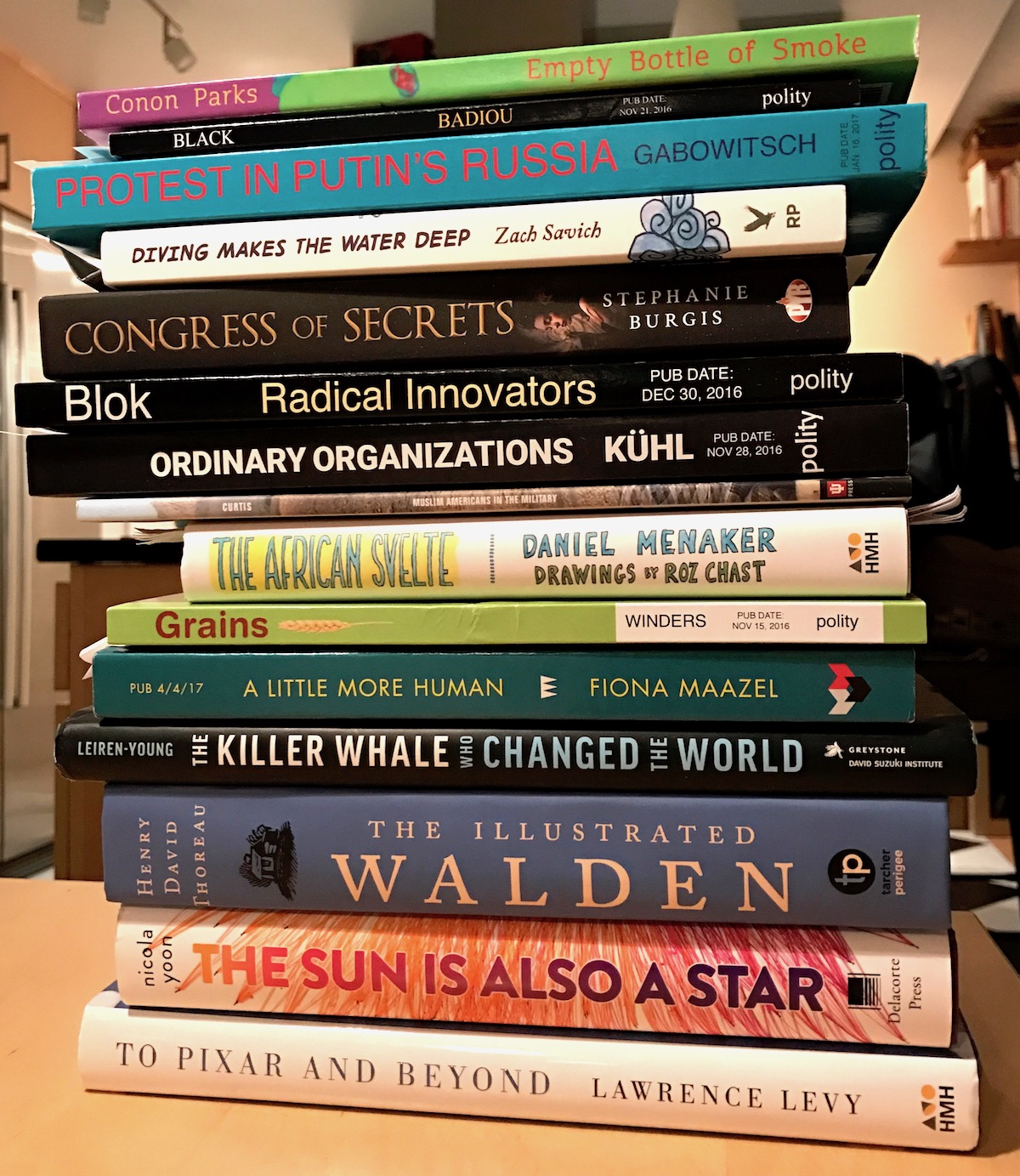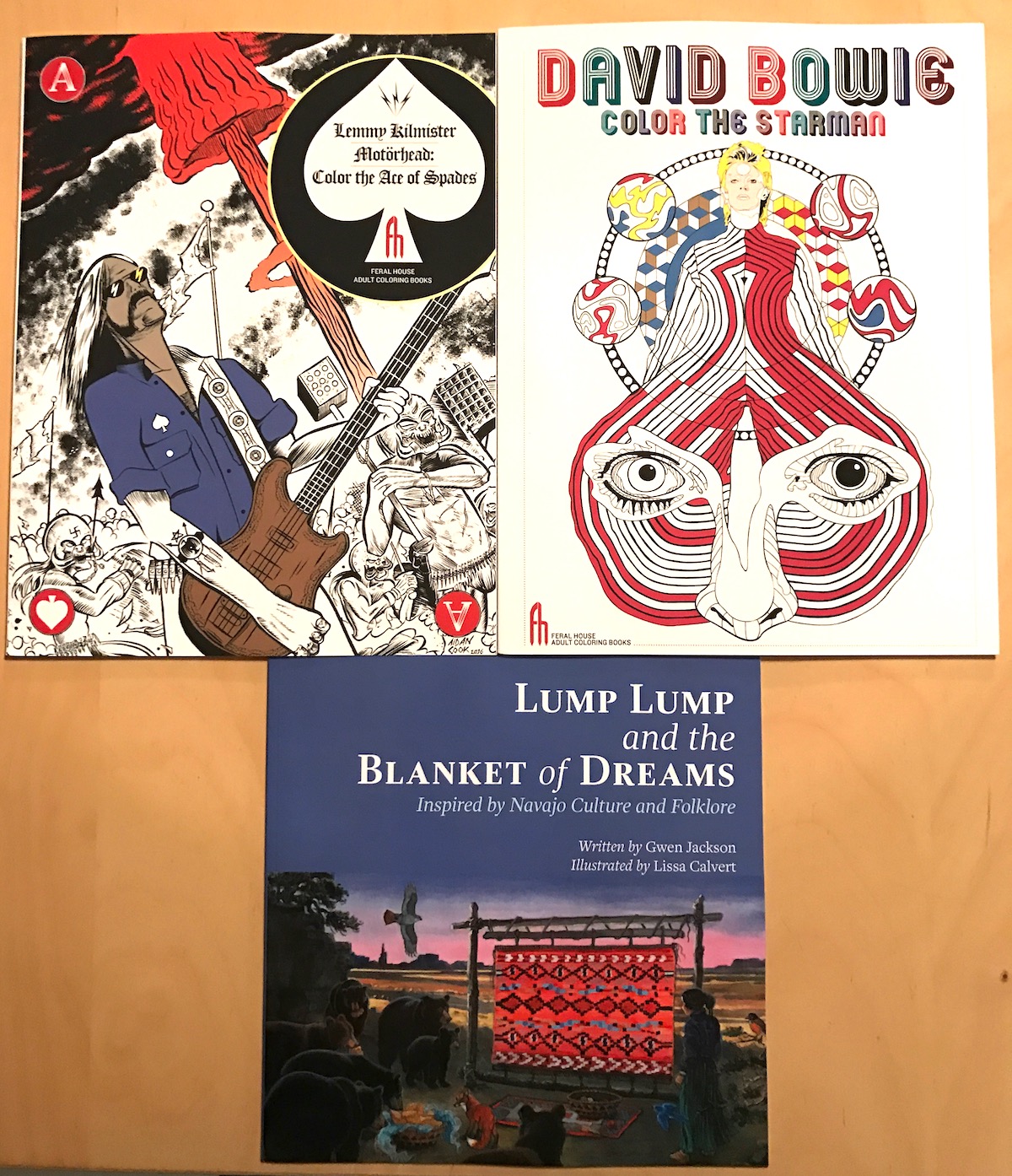The Bolted Book Facsimile: An Exact Copy of Depero Futurista - Kickstarter Fund Project #43
Every week, the Seattle Review of Books backs a Kickstarter, and writes up why we picked that particular project. Read more about the project here. Suggest a project by writing to kickstarter at this domain, or by using our contact form.
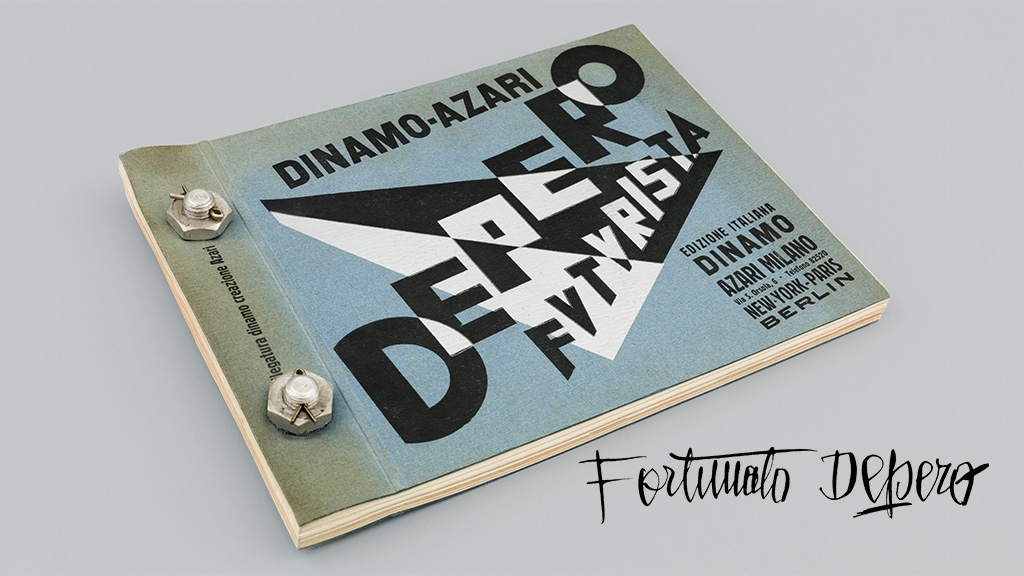
What's the project this week?
The Bolted Book Facsimile: An Exact Copy of Depero Futurista. We've put $20 in as a non-reward backer
Who is the Creator?
What do they have to say about the project?
Help us publish the first exact copy of Fortunato Depero’s 1927 iconic work of avant-garde graphic design and book-making.
What caught your eye?
One of the great things about the age we live in, and tools like Kickstarter, is the new market for specifically targeted campaigns for things that might not otherwise see the light of day.
In this case, it's a facsimile copy of Fortunato Depero's famous 1927 artist's book, a piece of high experimental design, typography, and playful artistry from one of the writers of the Futurist manifesto. This book is one of those sought-after artifacts that only wealthy collectors can afford — only 1000 were made, and who knows how many have survived to this day?
If you love art history, design history, and book history, then this project is the junction point where all three collide, but it's worth backing even if you only like one.
Why should I back it?
This is Designer & Books third Kickstarter. I personally backed their first, the reproduction of Ladislav Sutnar's Visual Design in Action, and earlier this year, we recommended their publication of Seymour Chwast's book on war paintings.
In short, they are experienced at delivering a high quality product, and so this exciting, and complicated, undertaking is in good hands.
How's the project doing?
At $249,000, this is the biggest ask they've made yet, but at over half-way there, and 33 days to go, looks like they have a shot. Get your copy now!
Do they have a video?
Kickstarter Fund Stats
- Projects backed: 43
- Funds pledged: $860
- Funds collected: $700
- Unsuccessful pledges: 2
- Fund balance: $180
The Help Desk: Rules for writing in books
Every Friday, Cienna Madrid offers solutions to life’s most vexing literary problems. Do you need a book recommendation to send your worst cousin on her birthday? Is it okay to read erotica on public transit? Cienna can help. Send your questions to advice@seattlereviewofbooks.com.
Dear Cienna,
How do you feel about writing in books? I mean, jotting notes in the margins and highlighting and all that crap. I read somewhere that doing that is supposed to make you smarter, but it just seems like defacing the book to me. And even if it kills the resale value (eh, who cares), why would I want my thoughts plastered all over, I dunno, Anna Karenina or whatever. That’s what diaries and journals are for. God, I’ve seen some pretty stupid shit written in books. Then again, I’m not really that smart myself, so maybe I’m missing out on something.
Bertrand, Greenlake
Dear Bertrand,
I never write in books for the same reason I have never kept a journal or a diary: I don't want to give the government yet another means of reading my thoughts.
But yes, I'm generally fine with other people writing in books – in fact, I enjoy reading anonymous people's opinions as they clash or agree with the text. In that way, books are like bathroom stalls and comments are consensual voyeurism (my favorite kind of voyeurism!). I kind of wish all of my books came with anonymous, thoughtful dialogue but as I read in a book somewhere, if wishes were horses we'd all be eating dog food for dinner.
There are rules to writing in books, of course. They can be summed up as follows: always write in pencil, ditch the highlighters and never obscure the text for the next reader.
Kisses,
Cienna
What you missed at Lit Crawl while you were busy attending Lit Crawl
Someone more equipped to do arithmetic should figure out how many possible combinations of readings were available at Lit Crawl last night. With 35 readings stretched across four hours, your Lit Crawl experience was guaranteed to be different from mine. And that’s sort of the appeal: to overwhelm your senses and to give you too many options. You’re supposed to finish Lit Crawl feeling as though you missed out on something.
That said, my Lit Crawl was pretty damn great. I started my evening at the Poetry Northwest reading at Folio downtown. The strict 45-minute time limit made a perfect length for a poetry reading, and all three poets were seasoned performers who know how to keep a crowd entertained. Sierra Nelson started out the night with a delightful array of poems mostly taken from her upcoming collection to be published by Poetry Northwest’s brand-new press. She read a pantoum about pickup trucks, an ode to lactation, and she closed with a poem about death that did not feel in the least funereal. Megan Snyder-Camp read poems from one of her two new collections this year, The Gunnywolf, and Jane Wong read an old poem titled “Aphoristic” and poems from her new collection Overpour. All three represented a generation of Seattle poets who are just now coming into their own, publishing books, presenting their work with great confidence, and fortifying their work with the wisdom that comes from years of writing and reading. It was a bill I’d like to see replicated at future events.
The “It’s All Relative” reading at Barça was marred by a lack of microphone: save for a few random words carried over on currents of laughter, I couldn’t hear the first two readers at all. Happily the third reader, Hanna Brooks Olsen of Seattlish and—full disclosure—my day-job colleague, was loud enough to overcome Barça’s sound quality issues. Olsen told a funny story about her history of eating disorders that, if told by another storyteller, might well have been completely horrifying. Part of the appeal of her reading was the way she told the story: Olsen doesn’t read in the ostentatious “I’m-going-to-talk-at-you-now” style that plagues some memoirists. Instead, she sounds as though she just wandered over to you at the bar and started telling a story about being poor and instinctually hating “fancy people.” It was casual, confessional, and the scathing observations on class practically stripped the paint off the walls.
In the basement of Capitol Cider, Mattilda Bernstein Sycamore hosted a miniature edition of her “Contagious Exchanges” reading series that usually takes place at the Hugo House. Readers Tobi Hill-Meyer and Elizabeth Colen joined Sycamore for a conversation about sex and violence and attraction. Sycamore is an incisive interviewer, skipping over the how-do-you-do’s and jumping directly to the biggest issues in the room, asking Hill-Meyer about a line in her story claiming that “the opposite of attraction isn’t repulsion, it’s indifference.” They discussed the way transphobic people — mostly men — obsess over trans people, and that conversation naturally led to Colen’s book about a queer couple moving to a small town.
Sycamore also touched on one of the challenges unique to LGBTQ writers right now. When Hill-Meyer found herself to be one of the elders of the trans community at the age of 26, she realized that there wasn’t much of a history of functional trans culture to fall back on. All the writers agreed that because there’s relatively little out and proud LGBTQ history and culture to rely on, the accepted vocabulary changes over the course of very small generations of three or four years. Hill-Meyer recounted reading a piece she wrote less than a decade ago and being surprised to find quite a few words that would not longer be considered acceptable in the community. Queer writers, then, have to simultaneously discover, explore, and map new terrain in real time.
For the final hour of Lit Crawl, memoirist and animator Steph Kesey read a very strong and funny 15 minutes about a relationship. Unfortunately, her reading went on for over 50 minutes. The premise of Kesey’s “Hey There, Macaroni” is clever: it’s the story of a relationship, as told in animated slides of semi-anthropomorphic macaroni. (“Macaroni is the only thing that’s a penis and a vagina at the same time,” she explained.) The slides were fantastic — crudely animated gifs of macaroni rutting and penetrating each other and nibbling at each others’ ends in a somewhat pornographic Möbius strip—but there were just too many of them, and after a while the narration became numbing. (Kesey was a very likable host, assuring the audience after one especially explicit slide that “if at any point this makes you uncomfortable, remember: they're just noodles.” If Kesey had presented a shorter show with two other animator/writers, or presented two or three different short projects, “Hey There, Macaroni” would be a high point in the evening. Kesey plans to put “Hey There, Macaroni” on Instagram, and perhaps the piece will scan differently when the audience can read through it at their own pace, but in the end the audience was stuffed beyond bursting with fornicating pasta.
The low point for many people’s Lit Crawl probably came during the after-party, when I guest-bartended for a half-hour. For those who had to wait while I struggled with a cork, or who patiently stood holding their Rainiers as I figured out the credit card reader, or who didn’t grimace when I handed them a fistful of wet bills: thank you. Your sacrifice to the literary community has not gone unnoticed.
Portrait Gallery: Bruce Lee
Each week, Christine Marie Larsen creates a portrait of a new author for us. Have any favorites you’d love to see immortalized? Let us know
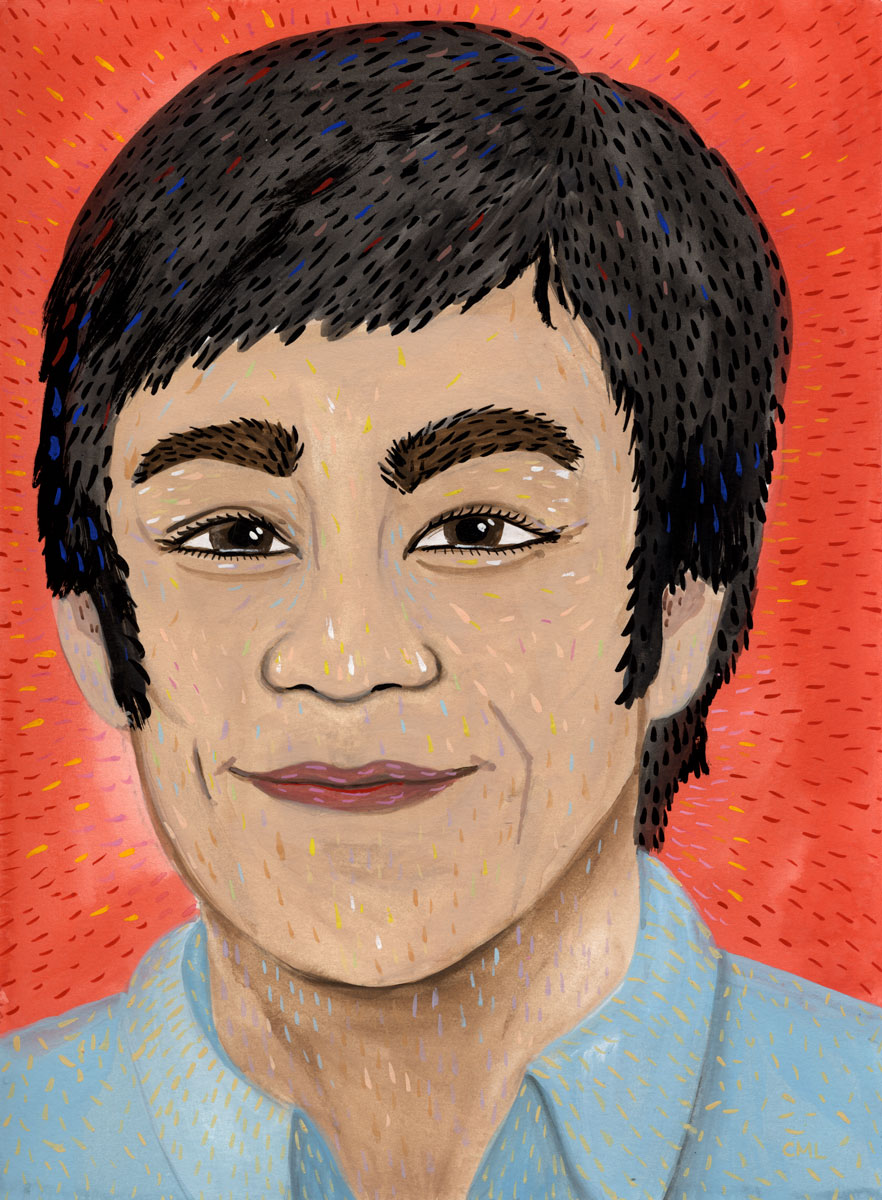
Sunday October 30th:
Lake View Cemetery Walking Tour
The Seattle Obscura Society leads a historical tour of Seattle’s highest-profile cemetery, from well-known tourist destinations (Bruce and Brandon Lee’s grave) to sites marking some of the darker moments in Seattle history. Lake View Cemetery, 1544 15th Ave E., http://atlasobscura.com, $20, 2:30 p.m.
Do You Know Bruce?
Have you visited the Wing Luke Museum to see the latest installation of the "Do You Know Bruce?" exhibition series? Part 3 "A Day in the Life of Bruce Lee" opened earlier this month and gives a glimpse at Bruce's every day routines, habits, and strategies for balancing his physical and artistic pursuits.
Get painted by Christine!
Christine is taking on a limited amount of commissioned portraits, in her Seattle Review of Books style, in advance of the holidays. If you want a portrait of a friend, loved one, pet, or even yourself (immortalize your bossest selfie!) for your own wall, or as the most thoughtful gift you can possibly imagine, then please do reach out. There's more information on her website.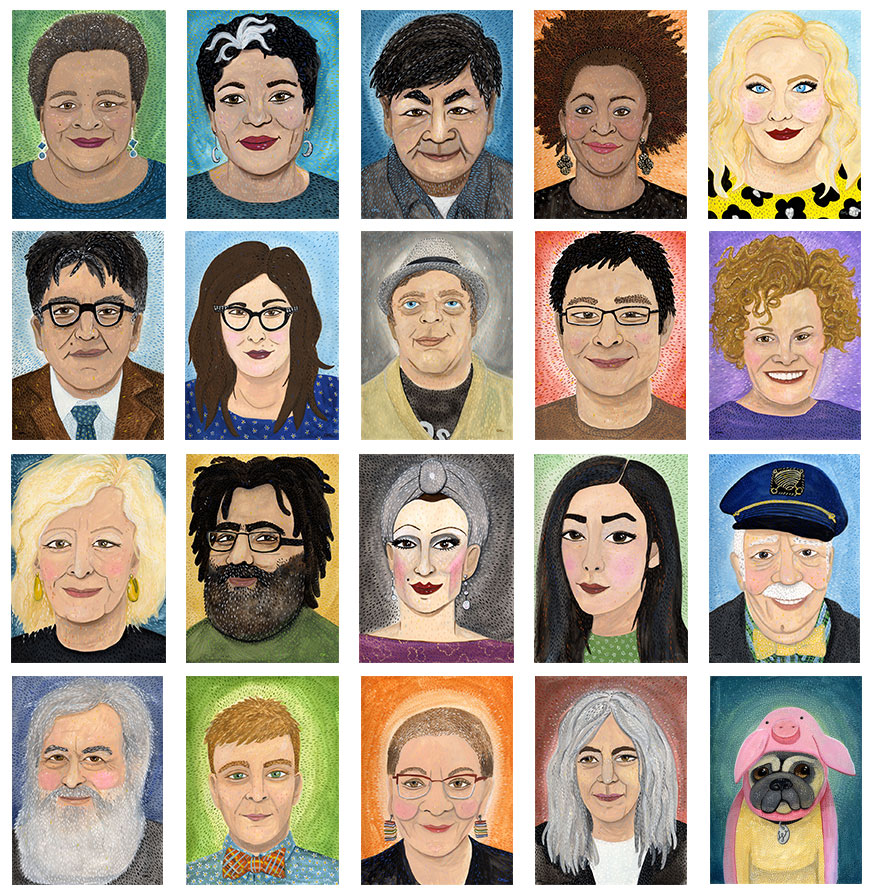
Criminal Fiction: some October surprises
Every month, Daneet Steffens uncovers the latest goings on in mystery, suspense, and crime fiction. See previous columns on the Criminal Fiction archive page
As the nights grow longer and darker, there are many ways to sneak yourself into the seasonal mood: peruse mystery maven Janet Rudolph’s annual list of Halloween Crime Fiction; settle in with Tim Burton’s animated visual treat, The Nightmare Before Christmas; or snuggle under the duvet with Chris Ewan’s Halloween-related thriller Dark Tides.
Reading around: new titles on the crime fiction scene
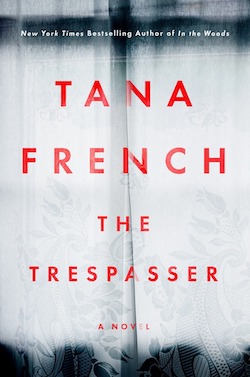
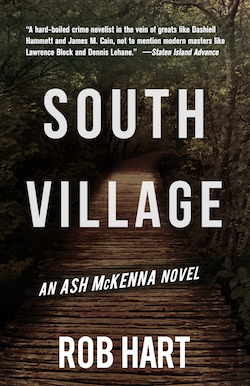
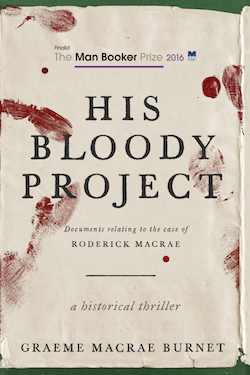
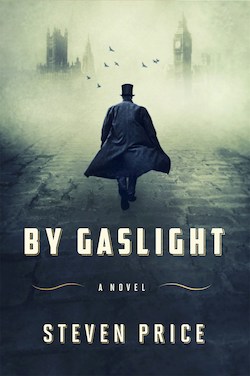
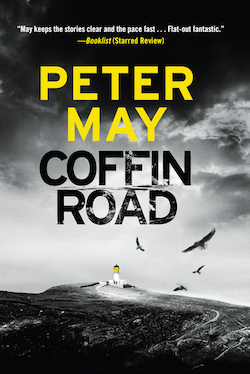
The Quintessential Interview: Elizabeth George
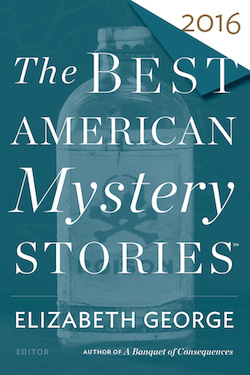
What or who are your top five writing inspirations?
I'm inspired by England's culture, history, traditions, sense of ceremony, and determination to preserve what they have. I'm also inspired by true crime and the need for justice. I'm inspired by the trajectory of John le Carré's career with regard to his growth as a writer. I'm inspired by my great affection for my characters. I'm inspired by the sense of well-being that I have when I write.
Top five places to write?
I'm lucky to be able to write just about anywhere as long as it's quiet or I have earplugs with me. I write mostly at home in my office which is above the garage here on Whidbey Island, but I also write in our condo on Capitol Hill in Seattle. Other than that, it's pretty much wherever I am. Recently I wrote while in Moscow, St. Petersburg, Riga, Osla, and Vilnius.
Top five favorite writers?
John le Carré, Tana French, John Fowles, Jane Austen, Shakespeare
Top five tunes to write to?
I write in silence unless my dog starts barking.Top five hometown spots?
On Whidbey: Mukilteo Coffee Roasters, Moonraker Books. In Seattle: Green Eileen, Book-It Repertory Theatre, Pike Place Market, driving along Lake Washington to Seward Park and walking around the peninsula with my dog. I also like the Sun Liquor Cocktail lounge on Summit. It's a real cocktail lounge for grownups with grownup drinks.
The Seattle Review of Books is coming to you on Friday night
Tomorrow night, you'll have two opportunities to see the co-founders of the Seattle Review of Books in public events.
I'll be part of a special panel at Town Hall hosted by Seattlish editor Hanna Brooks Olsen. It's a voting happy hour, and a bunch of smart folks — including Mayor Mike McGinn, South Seattle Emerald editor Marcus Harrison Green, and more — will be on hand to help you work through the important issues on your ballot. So if you're not sure how to vote this year, come talk to me about it. I promise to not be bossy about it. Plus: free stamps! It's at 5:30, it's absolutely free, and it should be a good time.
But if you've already voted, or if you're looking for something book-related to do, you should head to Phinney Books, where the Seattle Review of Books co-founder Martin McClellan will be taking part in a literary wake for the hardcover edition of Phinney Books owner Tom Nissley's extraordinary book The Reader's Book of Days. The idea of mourning for a remaindered title is a great, funny idea, and Martin will be joined by local writers Joshua Mohr and Nicole Dierker. This event is free, refreshments will be served, and it starts at 7 pm.
And the best news? If you hurry, you can probably attend both events in one super-packed evening. We'll see you out there.
Have you read Sarah Galvin's great review of Michelle Tea's new memoir/novel Black Wave yet? You should! It's a wonderful celebration of Tea's impact on young readers that also includes the words "sex millionaire."
Tea herself notified us last night, however, that the review needs one correction:
@seattlereviewof ❤️❗️Though it's @MattDillon I fuck in the book. I would NEVER fuck Brad Pitt.
— Michelle Tea (@TeaMichelle) October 27, 2016
@seattlereviewof And by 'I' I mean 'Michelle,' of course.
— Michelle Tea (@TeaMichelle) October 27, 2016
This is clearly the best call for a correction we've ever received. Thanks to Michelle Tea for being so awesome. We'll update the review presently.
Selling mansions in heaven
Published October 27, 2016, at 9:59am
Now that Jack Chick has died, can we get to know the man from his hateful Christian comics?
Book News Roundup: Meet the new Literature and Humanities Program Director at SPL
Stesha Brandon, the former University Book Store and Town Hall Seattle rock star who most recently was interviewed on this site in her role as interim executive director of the Seattle City of Literature organization, is officially the new Literature and Humanities Program Manager at Seattle Public Library. The job description calls for the creation of "public programming that connects patrons to information, ideas, and stories" and which "respond[s] to the evolving interests and needs of our communities by developing and supporting public events and activities that promote cultural enrichment, reading and storytelling, and community building." In short, Brandon will be doing the readings curation and community outreach that she did so well at University Book Store and Town Hall. Brandon's hire does a lot to ease my concern that Chris Higashi's departure created; the library needed another strong advocate for books and literary events on staff, and now they have one in Brandon. (She'll continue working with the board of Seattle City of Literature, too.) Congratulations to Brandon, and to SPL for the great hire.
Every so often, McSweeney's absolutely cleans your clock with a perfect piece of humor writing. Meg Elison's "If Women Wrote Men the Way Men Write Women" is one such piece:
Brett pulled his tank top up over his head and stared at himself in the full-length mirror. He pushed down his jeans, then his boxers, and imagined the moment when Jennifer saw him nude for the first time. His feet were average-sized, and there was hair on his toes that he should probably take care of before tonight. He liked his legs just fine, but his thighs were wide and embarrassingly muscular. He tried standing at an angle, a twist at his waist. Some improvement. In that position, it was easier to see his ass and notice that it was not as pert as it had been at 22. He clenched both cheeks, hoping that tightened its look. He sucked in his tummy and pulled his pecs up high, trying to present them like pastries in a bakery window. Would she like him? Were the goods good enough? He pouted his lips and ran his hands over his thighs, masking their expanse. Maybe.
The world's greatest slang dictionary is now available online.
August 2016 bookstore sales are up two percent.
This fan-run change.org petition to get Quentin Tarantino to direct the Deadpool sequel is so incredibly dumb that I have to include it here, even though it's only tangentially related to books. Why would Quentin Tarantino, who has never in his life directed a full-length movie written by someone else, suddenly decide to take on a sequel to a corporate superhero property? Because you like Deadpool and you like Quentin Tarantino? I like macaroni and cheese and I like Ritter Sport Chocolate Biscuit bars, but you don't see me blending them together into a smoothie, do you? I'm usually loath to use the term "fan entitlement," but it absolutely applies here.
Your Week in Readings: The best literary events from October 26th - November 1st
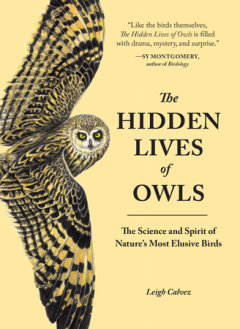
Wednesday October 26th: The Hidden Lives of Owls Reading
Look, fuck the election; it’s time to talk about owls. Leigh Calvez is an owl expert who will explain why owls are simultaneously cooler and more disgusting than the Harry Potter books ever let on. Maybe she’ll also explain why they’re always wearing graduation caps in cartoons even if they haven’t graduated college. Third Place Books Lake Forest Park, 17171 Bothell Way NE, 366-3333, http://thirdplacebooks.com. Free. All ages. 7 p.m.Thursday October 27th: Lit Crawl
See our Literary Event of the Week column for more details. Various locations.Friday October 28th: On Translation
Seattle poet Maged Zaher will appear in conversation with Alejandro de Acosta to discuss the strengths and weaknesses of translation. Zaher is the editor of The Tahrir of Poems, an anthology of Egyptian poets, and de Acosta has translated essays and a book of literary criticism of the works of H.P. Lovecraft from Spanish to English. Open Books, 2414 N. 45th St., 633-0811, http://openpoetrybooks.com. Free. All ages. 7 p.m.Saturday October 29th: Halloween Comic Fest
For the fifth year in a row, participating comics shops are celebrating Halloween Comic Fest, in which comics shops give away free comics to anyone who drops by. While May’s Free Comic Book Day aims more at adults, this one is for the kids, with a bunch of age-appropriate books ranging from preschool to teens. Various comics shops, http://www.halloweencomicfest.com/StoreLocator. Free. All ages. 10 a.m.Sunday October 30th: Lake View Cemetery Walking Tour
The Seattle Obscura Society leads a historical tour of Seattle’s highest-profile cemetery, from well-known tourist destinations (Bruce and Brandon Lee’s grave) to sites marking some of the darker moments in Seattle history. Did you know the brother-in-law of Confederate President Jefferson Davis is honored in Lake View Cemetery, as well as the keeper of Seattle’s most infamous brothel? Lake View Cemetery, 1544 15th Ave E., http://atlasobscura.com, $20, 2:30 p.m.Monday October 31st: The Shadow Knows
If you enjoy podcasts like Serial or Welcome to Night Vale, you’re actually participating in a century-old form of storytelling. Seattle organization Sandbox Radio is dedicated to reviving the misunderstood art of the radio play. Come enjoy a full theatrical cast give voice to original spooky audio performances with live musical accompaniment. Town Hall Seattle, 1119 8th Ave., 652-4255, http://townhallseattle.org. $25. All ages. 7 p.m.Tuesday November 1st: What Light Reading
Young adult author Jay Asher’s novel Thirteen Reasons Why was a runaway success that’s now being adapted into a Netflix series. Nine years later, he’s finally ready to present his next book, a novel titled What Light, about a young woman who falls in love with a boy with a bad reputation. Secret Garden Books, 2214 NW Market St., 789-5006, http://secretgardenbooks.com, free, all ages, 7 p.m.After the end of the world
Published October 26, 2016, at 12:01pm
In Michelle Tea's latest memoir/novel hybrid, her years as a queer literary youth icon have caught up with her.
Literary Event of the Week: Lit Crawl 2016
In just five years, Seattle Lit Crawl has become more than just a bookish pub crawl — it’s now the fever-pitch climax of autumn, the busiest night of the busiest time of the year for literary Seattle. On the evening of October 27th, 35 readings (each lasting 45 minutes, with programs starting at 6, 7, 8, and 9 pm) will unfold all over downtown, First Hill, and Capitol Hill. You can find a full listing of all the readings at litcrawl.org, but here are a few itineraries to get you started. Feel free to mix or match, based on your interest.
If you’re looking to try something new: Your night starts at Ada’s Technical Books, where cartoonists Amy Camber, Robyn Jordan, Owen Curtsinger, and Lauren Armstrong will read new work. Next, head on to Barca, where Robert Lashley, Imani Sims, Anastacia Renee, Quenton Baker, Sakara Remmu, and Andy Yun give a reading titled “Fuck Yo Couch,” which press materials promise will reveal “a Rick James-level of disregard for politesse.” At 8 p.m., head to Capitol Cider for Contagious Exchanges, Mattilda Bernstein Sycamore’s conversational series about queerness and genre and literature, featuring Tobi Hill-Meyer and Elizabeth Colen. And finally, end up at Vermillion, where artist Steph Kesey presents new animated .gifs that tell a story about two pieces of pasta falling in love in a pot of boiling water.
If you only want the best of the best, regardless of genre or medium: Start at Folio: The Seattle Athenaeum downtown, where Poetry Northwest magazine presents up-and-coming poets Sierra Nelson, Megan Snyder-Camp, and Jane Wong. Next, head to Barca, where Steven Barker, Hanna Brooks Olsen, and Jeanine Walker will read non-fiction about family. Zoë Events hosts Monica Dimas, Angela Garbes, Anna Goren, and Rachel Kessler talking about what food means to ourselves and to others. Finally, head over to Capitol Cider, where Nicole Hardy, Peter Mountford, Ross McMeekin, and Paulette Perhach will read new fiction and non-fiction on the theme “A Fool and His or Her Money.”
If you can’t stop thinking about politics because it’s almost time for the election and Donald Trump is a sexist monster: Hugo House kicks off the night with Samar Abulhassan, Laura Da’, and Ann Teplick sharing their favorite radical feminist poets. At 7 p.m. down at Folio, Shankar Narayan, Jordan Alam, Pimone Triplett, and Margaret Rhee will read new work about what it means to be Asian-American in 2016. Stay at Folio for the 8 o’clock program, in which Martha Silano, Mary Ellen Talley, Gail Tremblay, and Sarah Zale will read work about women in the workplace. Then head to Zoë for the 9 p.m. reading. Kristiana Kahakauwila, Sara Marie Ortiz, Cooper Lee Bombardier, and Elissa Washuta read new non-fiction for VIDA, the feminist literary organization.
No matter where you go for the night, be sure to meet back up for the afterparty at Velocity Dance Center, which promises original works of dance and music in response to writing, and DJ Chuck spinning records until midnight. Maybe drink too much and call out sick the next day; after all, Lit Crawl comes but once a year.
Novelist Paul Beatty has won the Man Booker prize for The Sellout, his deeply satirical novel about race in our country. Great news, and congratulations to Beatty. This is the third year the prize has been open to writers of any nationality, and Beatty is the first American author to take it.
Before there was a Seattle Review of Books, co-founder Paul Constant reviewed the book for our good friends over at Seattlish:
The Sellout is a novel that reads, basically, like one very long, very racist joke. That’s almost certainly part of its design. Its author, Paul Beatty, wrote the very funny novel The White Boy Shuffle, and he also edited Hokum: An Anthology of African-American Humor. In 2015, you can understand how a book with this premise could be a hard sell; the fact that the cover’s sole visual element is a repeated image of a lawn jockey about the size of a Polo Ralph Lauren logo embroidered on a shirt probably doesn’t help matters, either.
You can read the whole thing here.
Delighted to announce our #ManBooker2016 winner is The Sellout by Paul Beatty: https://t.co/wmbl4QT7aV pic.twitter.com/u93YtHluvV
— Man Booker Prize (@ManBookerPrize) October 25, 2016
There's No Place Like Home
Published October 25, 2016, at 1:06pm
This Thursday at Third Place Books Seward Park, the community will come together to celebrate the first print collection of writings that have appeared in the South Seattle Emerald. Here's why that's important
#JournalismSoWhite
In advance of tonight's #JournalismSoWhite event at Town Hall, we wanted to recall our own diversity reports, written by our Public Diversity Editor, Vanessa Willoughby.
We published Vanessa's first report on September 7th of this year. We think her observations and analysis of our work on this issue were right on-point.
As she pointed out: "Whether it be diverse representation in film or a diverse workplace, sometimes diversity doesn’t necessarily mean equality. A company could mistakenly believe that they’re diverse because they have a few people of color in an otherwise very white staff."
The day after we published her piece, we responded. Vanessa has agreed to come back at regular intervals and gauge our growth on these important issues.
We call on all publications to take the simple step we did — let an outside auditor evaluate your diversity, so that any tallies or calculations are free of your own internal biases. We'd love to see a media landscape where publications are held to task for the important work of inclusivity.
It's true that Donald Trump has admitted to never reading books. But in case you think he doesn't care about books, please note that the Huffington Post revealed that Trump bought $300,000 in small donations to his campaign on books last month. Of course, the books he bought were copies of his ghost-written memoir The Art of the Deal. Weirdly, Trump also offered signed copies of The Art of the Deal as a fundraiser, even though...
Trump’s statement calling the book “out-of-print,” repeated on the committee’s website, however, is false. The Art of the Deal had a new paperback edition printed last October, and the hardcover is currently in print and available from Random House and retail booksellers. Barnes and Noble, for example, sells it for $22.35.
So Donald Trump isn't just a liar. He lies about books. How much lower can you get?
The Cult of Iuvenis Invictus
(for Abbey, Belle, Circa, Fiddleback, Fritz, Oscar, Sideway, Toast, and Zan)
The Vixen pinks his way through whiskers,
strikes a nice plié,
then knocks a shot of Jäger back,
and drops some Fourier.The shaven Lion shyly strides
beside his own conceit:
a guileless wilding
twice defiled, but innocent and sweet.Mama Panda and her Pup
(wily as Montaigne)
splay their limbs in slick abandon,
rolling through the rain.She's a powder-hounded faun
with talcum in her eyes —
he's Dauphin of Malcontrites:
: the locus of surprise.The Kangaroo who used to wear
a Fox's gold lapel
casts himself on infant seas
and rides each roll and swellRainbow Rat, the dayglo champ
of pan-harmonium
wriggles in a bedsty tizzy,
nursing at his thumb.The Folf-cum-Husky's snugly tucked
and tangled up in blue
and white and glows so bright
he turns the old moon new.Even Wolves, who play at stern
and sober countenance,
lose themcells in padded selves
and capillary dance:though shadows blaze through every day
and coruscate the night,
we learn to see beyond the darkness
by each other's light.
A full short story from a talented writer
Sponsor Ronna Wineberg generously gave us permission to run an entire short story from her book Nine Facts That Can Change Your Life for her sponsorship this week. The story, "Bare Essentials", appears in full on our sponsor's page.
The book received great marks in Kirkus and the Village Voice, but it's what you think that matters most, which is why a full story is such a treat. Be sure to indulge yourself, and if you like it, click through to pick up the book.
Sponsors like Ronna Wineberg make the Seattle Review of Books possible. Did you know you could sponsor us, as well? Get your stories, or novel, or event in front of our passionate audience. There are some dates open perfect for pitching your product for the holidays. Take a glance at our sponsorship information page for dates and details.
Michael Schaub at the L.A. Times writes:
Lucia Perillo, a poet known for her sense of humor and her writing about living with multiple sclerosis, died on Oct. 16 at the age of 58 in Olympia, Wash., her publisher Copper Canyon Press confirms. Her most recent book, “Time Will Clean the Carcass Bones,” was published in February.
Perillo was a MacArthur "Genius" Fellowship winner, her work was shortlisted for the Pulitzer Prize, and she was no stranger to the Seattle literary scene. If you haven't read her before, I'd recommend "Found Object," because it's a great summation of her work: bawdy, observational, rooted in her perspective but generous and big-hearted and curious at the same time. I hope someone in Seattle will host a reading to celebrate Perillo's life; if this happens, I'll let you know.
